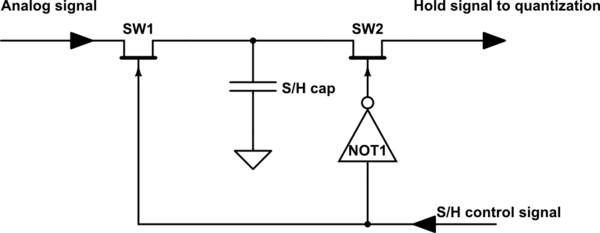Discrete systems work on sampled signal values. Suppose if we want to implement such a system like a discrete amplifier (i.e., \$y[n] = A\cdot x[n]\$), how do we make sure that the input to this system is available only at discrete time intervals? Even if we use sample and hold circuits, the data on the sampling capacitor may change during the sampling time interval.How do we ensure that data input to the system doesn't change between successive sampling times?
1 Answer
Many MCU implement the acquisition of the signal with a dual switch system.

simulate this circuit – Schematic created using CircuitLab
That is, the two switching elements are operated with a single signal, so as to have opposite conduction states.
While a state applies the signal to the capacitor, when the corresponding signal is activated, it stops applying the signal to the capacitor, and the voltage across the capacitor is available to be quantized.
The time during which the switch SW1 is closed, applying to capacitor signal is called the sample time or time of opening (\$t_s\$). The time during which the switch SW1 is open and SW2 is closed, is the time of quantization (\$t_q\$). Usually \$t_q\gg t_s\$
-
\$\begingroup\$ Could you please provide me some links where I can read more about this. \$\endgroup\$– sarthakCommented Sep 21, 2014 at 6:11
-
\$\begingroup\$ How would we physically implement a delay (i.e. z^-1) which might be used in a feedback, using these switches? \$\endgroup\$– sarthakCommented Sep 21, 2014 at 6:31
-
\$\begingroup\$ @sarthak Here: analog.com/static/imported-files/application_notes/… there is an itroductorial application note. \$\endgroup\$ Commented Sep 21, 2014 at 6:34
-
\$\begingroup\$ @sarthak To implement a delay in discrete time (\$z^{-1}\$) you must use a memory element to retain the value of the last sample... \$\endgroup\$ Commented Sep 21, 2014 at 6:36
-
\$\begingroup\$ So do the discrete time filters like 1/(1-z^-1) use memory elements to perform the desired filtering. And if we are using memory does these filters only act on quantized data? \$\endgroup\$– sarthakCommented Sep 21, 2014 at 6:38
